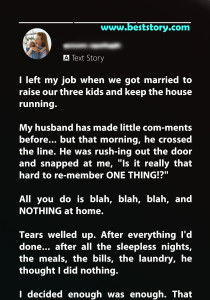Harry had it all—a rising tech career, a successful app launch, and a wife, Sara, who stayed home to care for their children. But instead of gratitude, he gave her criticism. Every morning, Sara greeted him with warmth, and every day, he dismissed her with contempt. “You sit at home all day doing nothing,” he’d snap, blind to the invisible labor that kept their household running.
One morning, his rage over a missing shirt spiraled into cruel accusations. Sara, exhausted and emotionally drained, collapsed later that day. The ambulance took her away. On the table, Harry found a note: “I want a divorce.”
At the hospital, Sara’s sister confronted him. “You told her she wasn’t wife enough. She believed you.” The doctor confirmed it was a stress-induced attack. When Harry tried to apologize, Sara’s voice was firm: “I chose you over my dreams. And it ruined me.”
Left alone with the kids, Harry struggled. Burnt breakfasts, missed meetings, and sleepless nights revealed the truth: Sara had never been idle. She had been holding the family together. Her absence was a mirror—and it showed him everything he refused to see.

Five months later, Sara returned—not to reconcile, but to reclaim her life. She wanted custody. In court, Harry admitted his failure. “I mocked her for doing nothing. But she did everything.”
The judge listened. So did Sara. And for the first time, Harry understood: respect isn’t earned by success—it’s revealed in how we treat those who sacrifice for us.